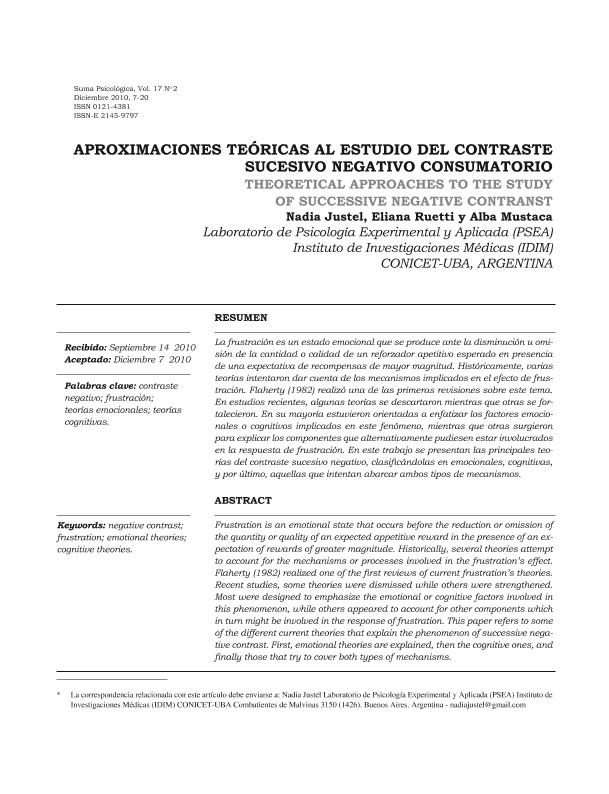Artículo
La frustración es un estado emocional que se produce ante la disminución u omisión de la cantidad o calidad de un reforzador apetitivo esperado en presencia de una expectativa de recompensas de mayor magnitud. Históricamente, varias teorías intentaron dar cuenta de los mecanismos implicados en el efecto de frustración. Flaherty (1982) realizó una de las primeras revisiones sobre este tema. En estudios recientes, algunas teorías se descartaron mientras que otras se fortalecieron. En su mayoría estuvieron orientadas a enfatizar los factores emocionales o cognitivos implicados en este fenómeno, mientras que otras surgieron para explicar los componentes que alternativamente pudiesen estar involucrados en la respuesta de frustración. En este trabajo se presentan las principales teorías del contraste sucesivo negativo, clasificándolas en emocionales, cognitivas, y por último, aquellas que intentan abarcar ambos tipos de mecanismos. Frustration is an emotional state that occurs before the reduction or omission of the quantity or quality of an expected appetitive reward in the presence of an expectation of rewards of greater magnitude. Historically, several theories attempt to account for the mechanisms or processes involved in the frustration’s effect. Flaherty (1982) realized one of the first reviews of current frustration’s theories. In recent studies, some theories were dismissed while others were strengthened. Most were designed to emphasize the emotional or cognitive factors involved in this phenomenon, while others appeared to account for other components which In turn might be involved in the response of frustration. This paper refers to some of the different current theories that explain the phenomenon of successive negative contrast. First, emotional theories are explained, then the cognitive ones, and finally those that try to cover both types of mechanisms.
Aproximaciones teóricas al estudio del contraste sucesivo negativo consumatorio
Título:
Theoretical approaches to the study of successive negative contranst
Fecha de publicación:
07/2010
Editorial:
Fundación Universitaria Konrad Lorenz
Revista:
Suma Psicológica
ISSN:
0121-4381
e-ISSN:
2145-9797
Idioma:
Español
Tipo de recurso:
Artículo publicado
Clasificación temática:
Resumen
Palabras clave:
Contraste Negativo
,
Frustración
,
Teorías Emocionales
,
Teorías Cognitivas
Archivos asociados
Licencia
Identificadores
Colecciones
Articulos(IDIM)
Articulos de INST.DE INVEST.MEDICAS
Articulos de INST.DE INVEST.MEDICAS
Citación
Justel, Nadia; Ruetti, Eliana Martha; Mustaca, Alba Elisabeth; Aproximaciones teóricas al estudio del contraste sucesivo negativo consumatorio; Fundación Universitaria Konrad Lorenz; Suma Psicológica; 17; 2; 7-2010; 7-20
Compartir
Altmétricas




